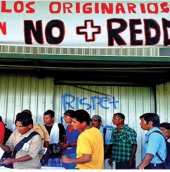Radio Mundo Real
http://radiomundoreal.fm/9170-costa-rica-bribri-indigenous
5 de julio de 2016 | Noticias | Financiarización de la naturaleza | Anti-neoliberalismo | Bosques y biodiversidad | Justicia climática y energía | Soberanía Alimentaria

Costa Rica: Bribri indigenous people continue resisting REDD+ project in their territory
Bribri indigenous communities of Talamanca region, Limon province, Costa Rica, gathered over 300 signatures throughout their territories to support the “Bribri territories free from REDD+ Declaration”, a document that was already submitted to authorities.
They are also denouncing that the information and consultation process for the implementation of the REDD+ mechanism of the government has been disrespectful and carried out in bad faith, since it did not take into account the basic principles of free, prior and informed consent.
The Bribri communities are arguing that the Reducing Emissions from Deforestation and Forest Degradation in Developing Countries mechanism (REDD) is a false solution to climate change because it works as a carbon emission offset mechanism, i.e., it allows companies to buy permits to continue polluting.
Also, they highlight that REDD+ is a serious threat for communities that depend on forests, because it limits the indigenous use of the ecosystem for shifting cultivation, gathering and traditional subsistence uses. Research about different cases of REDD implementation in several parts of the world have pointed out to the fact that indigenous communities are seeing serious limits, or even bans, on their access to forests, on which they depend for their livelihoods.
That´s why Bribri communities enforced their right to make their own decisions, recognized in international instruments such as Convention 169 of the International Labor Organization (ILO) about Indigenous Peoples, for their “Bribri territories free from REDD+ Declaration” to prevent the mechanism from being implemented in their lands.
According to information sent to Real World Radio by COECOCEIBA – Friends of the Earth Costa Rica, members of the Bribri communities of the South Caribbean have been expressing since 2010 in meetings, workshops, statements, press conferences and assemblies that REDD+ projects do not benefit indigenous people.
Also, the Bribri warn that in the past eight years the Talamanca forests are in the sight of REDD+. “They have the interest of international climate change policy negotiators of the Costa Rican government, international cooperation and international financial institutions”, they state in a document accessed by Real World Radio. Among the “interested” local actors we find the National Forest Finance Fund (FONAFIFO) and the Environment and Energy Ministry itself, with the international pressure of large transnational corporations and the World Bank, among others.
On the other hand, the Bribri communities highlight that the signing of a REDD+ agreement represents an open door for other negotiations on the Bribri territories and their resources, with corporations and foreign institutions; they also state that REDD+ involves restricting the community use of forests in indigenous territory; and that the negotiation of a project of this kind takes more than eight years, although most communities are unfamiliar with the process.
The indigenous people point out that the participation in the negotiations with the government has been reduced to ADIs (Integral Development Associations) of each indigenous territory in the country, in addition to a few other organizations such as RIBCA (the Bribri and Cabecar Indigenous Network), that do not represent the opinions of all native communities.